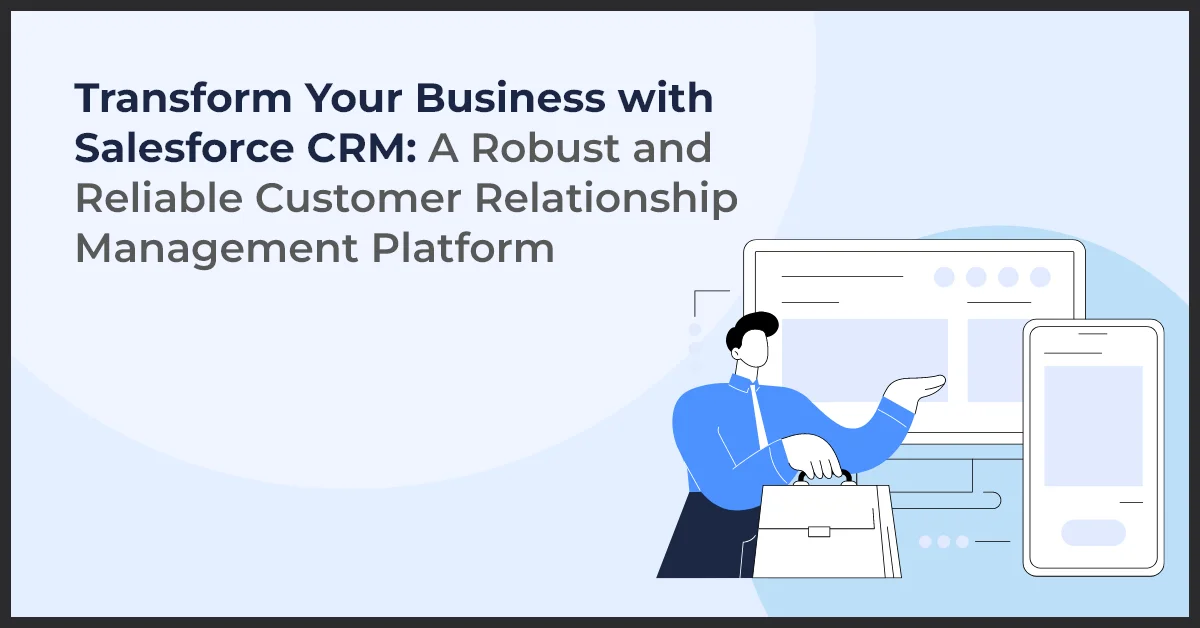Transform Your Business with Salesforce CRM: A Robust and Reliable Customer Relationship Management Platform

Published on: October 19, 2023
Updated on: September 17, 2024
2119 Views
- Salesforce
14 min read
Do you need help keeping track of your customer data, improving sales performance, and providing exceptional customer service? Whether a small startup or a large-scale enterprise, Salesforce CRM offers a comprehensive suite of tools and features to streamline your sales process and ensure customer satisfaction like never before.
Salesforce CRM is a cloud-based customer relationship management platform that allows businesses to manage their sales pipeline, leads, and customer interactions efficiently. Gone are the days of scattered spreadsheets, disjointed communication, and missed opportunities. With Salesforce, everything is seamlessly integrated, giving you a holistic view of your customers and empowering your sales team to close deals faster.
Its unwavering commitment to enhancing customer service and satisfaction sets Salesforce apart. Salesforce CRM provides businesses the tools to deliver personalized experiences, anticipate customer needs, and provide timely support.
With automation, intelligent analytics, and real-time collaboration, your team can focus on building meaningful relationships and delivering tailored solutions, all while exceeding customer expectations.
Salesforce Cloud Services
Salesforce Sales Cloud
Salesforce Sales Cloud is a powerful customer management tool to streamline sales processes and enhance customer relationships. With Sales Cloud, businesses can manage their sales operations effectively, track leads and opportunities, and close deals faster.
Features and benefits of Sales Cloud for customer management and sales processes:
- Centralized customer database for easy access to customer information
- Lead management and tracking to prioritize and convert leads into customers
- Opportunity management to track sales opportunities and forecast revenue
- Quoting and proposal generation to accelerate the sales cycle
- Workflow automation to streamline repetitive tasks and improve efficiency
How Sales Cloud helps businesses streamline their sales operations and improve customer relationships:
- Increased visibility into the sales pipeline and performance metrics
- Improved sales forecasting accuracy
- Better collaboration and communication within sales teams
- Enhanced customer engagement through personalized interactions
Salesforce Service Cloud
Salesforce Service Cloud is vital for delivering exceptional customer service and support. It empowers businesses to provide personalized and efficient customer support, increasing customer satisfaction and loyalty.
Importance of Service Cloud in delivering exceptional customer service and support:
- Efficient case management to track and resolve customer issues
- Omnichannel support to engage with customers across multiple channels
- Self-service portals and knowledge bases to empower customers to find solutions on their own
- Service level agreements (SLAs) to set performance targets and monitor service quality
Overview of crucial Service Cloud features and their impact on customer satisfaction:
- Unified customer view for personalized and contextual customer interactions
- Intelligent routing to ensure that suitable agents handle cases
- Automated workflows and macros to streamline support processes
- Real-time chat and social media integration for immediate customer assistance
Salesforce Marketing Cloud
Salesforce Marketing Cloud is crucial in effective customer engagement and targeted marketing efforts. It gives businesses the tools and capabilities to create, automate, and analyze marketing campaigns across multiple channels.
Role of Marketing Cloud in effective customer engagement and targeted marketing efforts:
- Single view of customers for personalized marketing communications
- Segmentation and targeting to reach the right audience with relevant messages
- Campaign management to plan, execute, and track marketing campaigns
Various marketing automation features offered by Salesforce:
- Email marketing automation for sending personalized and timely emails
- Social media management to engage with customers on social platforms
- Journey builder to create automated customer journeys based on predefined criteria
Insights on how businesses can leverage Marketing Cloud's capabilities for successful marketing campaigns:
- Improved customer targeting and segmentation for higher conversion rates
- Personalized and relevant marketing messages to boost customer engagement
- Data-driven insights to optimize marketing campaigns and drive better results
Salesforce Platform and Integration
The Salesforce Platform is a powerful ally as businesses strive for growth and competitive advantage. Its comprehensive suite of tools and services enables organizations to streamline processes, enhance collaboration, and drive innovation.
The Salesforce Platform offers a vast array of capabilities that span across sales, service, marketing, and beyond. Its flexibility allows businesses to customize and extend their CRM solutions to meet specific industry or organizational requirements.
With the Salesforce Platform, companies can manage customer data and interactions effectively, gain actionable insights, and make real-time data-driven decisions.
Relevance in Driving Business Growth
The Salesforce Platform empowers businesses to scale their operations, increase productivity, and improve customer satisfaction. By consolidating all customer data in one central hub, organizations can achieve a 360-degree view of their customers, enabling personalized and targeted engagement.
With the ability to automate repetitive tasks and workflows, time is freed up for sales and service teams to focus on building relationships and closing deals. Furthermore, the Salesforce Platform fosters team collaboration, breaking down silos and ensuring seamless communication and knowledge sharing.
Benefits Of Integrating Salesforce With Other Applications And Systems
Salesforce Integration with other critical business applications and systems is a game-changer. Businesses gain a unified view of their operations and customers by connecting Salesforce with ERP, accounting, marketing automation, or other vital systems.
Data flows seamlessly between systems, eliminating data silos and allowing for more accurate reporting and analysis. The integration also facilitates cross-functional collaboration, ensuring that all departments work with the same customer data set, resulting in improved efficiency, productivity, and customer satisfaction.
Salesforce Analytics: Leveraging Data for Customer Insights
Analytics plays a vital role in today's business landscape, providing valuable insights by examining vast amounts of data. Salesforce Analytics empowers organizations to unlock the full potential of their customer data, driving decision-making and enhancing customer understanding.
Driving Customer Understanding
By utilizing Salesforce Analytics, businesses gain a comprehensive view of their customers. Organizations can identify trends, patterns, and preferences by analyzing data gathered from various touchpoints and interactions that help them understand their customers more deeply. This understanding enables businesses to tailor their strategies and offerings to meet their customer base's specific needs and preferences.
Enhancing Decision-making
The insights provided by Salesforce Analytics enable businesses to make informed decisions that drive growth and success. By leveraging analytics-driven intelligence, organizations can identify opportunities, predict market trends, and optimize their sales and marketing strategies.
This data-driven decision-making process mitigates risks and maximizes business opportunities, ultimately leading to improved performance and profitability.
Impact on Sales Performance and Customer Satisfaction
With Salesforce Analytics, businesses can track and analyze sales performance metrics, such as revenue, customer acquisition, and conversion rates. These analytics-driven insights enable sales teams to identify areas for improvement, implement targeted strategies, and drive revenue growth.
Additionally, organizations can enhance customer satisfaction by delivering personalized experiences and tailored offerings by gaining a deeper understanding of customer behaviors and preferences.
Examples of the impact of Salesforce Analytics on sales performance and customer satisfaction:
- Identify upsell and cross-sell opportunities through customer purchase history and preferences analysis.
- Effective segmentation and targeting of customer groups based on demographics and behavior, leading to more relevant and personalized marketing campaigns.
- Identification of customer churn risks through predictive analytics, enabling proactive retention strategies.
Salesforce AppExchange (Marketplace for Salesforce Apps)
The Salesforce AppExchange is a vast marketplace that offers a wide range of third-party applications designed specifically for Salesforce. This marketplace plays a crucial role in extending the functionality of the Salesforce platform, allowing businesses to customize and enhance their customer interactions.
Using apps from the AppExchange can significantly benefit businesses by providing them with additional features and capabilities that are not available out-of-the-box in Salesforce. These third-party apps can streamline processes, automate tasks, and improve efficiency.
One key advantage of using AppExchange apps is their ability to enhance customer interactions. These apps offer a range of features that can help businesses provide better customer service and support. From advanced analytics tools to personalized marketing campaigns, AppExchange has apps for every customer-facing need.
When choosing the right apps from the AppExchange, it's essential to consider specific industry sectors and customer needs. Fortunately, there are numerous popular apps recommended for various industries. Whether in healthcare, finance, retail, or any other sector, tailored options are available to meet your unique requirements.
- Health Cloud: Designed for healthcare providers, this app enables seamless patient management, enabling healthcare professionals to provide personalized care.
- Financial Services Cloud: This app caters to the financial services industry's needs, offering features such as wealth management and client collaboration.
- Commerce Cloud: This app delivers advanced e-commerce capabilities for retailers, including omnichannel marketing and personalized shopping experiences.
- Service Cloud: Ideal for customer service teams, this app provides tools for case management, self-service portals, and contact center integration.
Salesforce Implementation and Training
Maximizing Salesforce's potential requires proper implementation and training. With a well-executed implementation process and thorough training, businesses may fully leverage the benefits of Salesforce.
Rolling out Salesforce successfully involves several key considerations. First, it is crucial to understand the business processes and requirements that Salesforce needs to address. This understanding will guide the customization and configuration of Salesforce to align with the organization's specific needs.
Next, a detailed implementation plan should be developed, outlining the steps involved in deploying Salesforce. This plan should include data migration strategies, system integration requirements, and user adoption strategies. Clear communication and collaboration between stakeholders are essential for a smooth implementation process.
During the implementation, ensuring that the Salesforce system is appropriately configured and customized to meet specific business needs is critical. This includes creating custom objects, fields, and workflows and setting up security and access controls. Testing and quality assurance processes should also be conducted to ensure the system functions as intended.
Once the implementation is complete, employee training is crucial in driving adoption and maximizing Salesforce's benefits. Training should cover the basics of Salesforce navigation, data entry, and reporting. Advanced training can include:
- Creating custom reports and dashboards.
- Utilizing automation tools.
- Managing sales processes within the platform.
Establishing best practices for using Salesforce is essential to improve customer service and productivity. This includes documenting and sharing knowledge about efficient workflows, data entry standards, and reporting methodologies. Ongoing training and support should be provided to address any updates or enhancements made to Salesforce.
Salesforce Automation
Streamlining sales operations is essential for businesses to stay competitive and meet revenue goals. Salesforce Automation is crucial in achieving this by automating various sales processes, reducing manual effort, and improving overall efficiency.
Understanding the Role of Salesforce Automation
Salesforce Automation refers to using technology to automate repetitive tasks and streamline sales operations. It ensures the sales team can focus on what matters most – building relationships, closing deals, and driving revenue growth.
Overview of Automation Features
Salesforce offers a range of automation features that empower sales teams to work smarter and achieve better results. These include:
- Automated lead and opportunity management: Salesforce Automation allows for automatic lead assignment, lead scoring, and nurturing. It also provides tools to manage the sales pipeline and track opportunities effectively.
- Workflow automation: With Salesforce, you can automate routine tasks, such as sending follow-up emails, updating records, and scheduling sales activities. This saves time and ensures consistency in sales processes.
- Intelligent sales forecasting: Salesforce's AI-powered forecasting tools enable accurate sales predictions, helping businesses make informed decisions and plan for the future.
- Sales performance tracking: Salesforce provides real-time analytics and dashboards that give insights into sales performance, allowing sales managers to identify areas for improvement and coach their team effectively.
Real-World Examples Showcasing The Impact Of Salesforce Automation
The benefits of Salesforce Automation are evident in the success stories of numerous businesses:
- An eCommerce company reduced its sales cycle by 30% after implementing Salesforce Automation. The automated lead nurturing process increased customer engagement and resulted in a 25% increase in sales revenue.
- A real estate company improved its sales team's productivity by 40% by automating repetitive tasks and streamlining its sales processes using Salesforce. Sales representatives could focus more on building relationships increasing customer satisfaction and loyalty.
- An IT company achieved a 20% increase in cross-selling and upselling opportunities with Salesforce Automation. Their system's intelligent forecasting capabilities helped their sales team identify new revenue streams and optimize their sales strategies.
Salesforce Customer Support
When providing exceptional customer support, Salesforce goes above and beyond to ensure its users have the best experience possible. By exploring Salesforce Customer Support capabilities and resources available, users can quickly resolve any issues they encounter and maximize the platform's performance.
One of the critical reasons why Salesforce has gained a reputation for outstanding customer support is its extensive range of support services. From self-service resources, including knowledge articles and tutorials, to 24/7 assistance from expert support agents, Salesforce leaves no stone unturned in providing comprehensive support to its customers.
Effective implementation is crucial for any organization adopting Salesforce, and the support services offered significantly contribute to this process. Salesforce support teams work closely with users to ensure a seamless transition and help them make the most of the platform's features and functionalities. From initial setup to ongoing support, users can rely on Salesforce's customer support every step of the way.
Furthermore, Salesforce understands that user experience is vital for an organization's success, and its support services significantly enhance the overall user experience. Through timely and efficient issue resolution, Salesforce enables its customers to overcome challenges swiftly and continue their operations with minimal disruption. This proactive approach to customer support ensures that businesses can fully leverage the power of Salesforce and achieve their goals.
Users can follow a few tips to make the most of Salesforce's customer support services. Firstly, familiarize themselves with the self-service resources, such as the extensive knowledge base and the Salesforce Help & Training portal. These resources provide valuable information and guidance for resolving common issues and improving platform performance.
Additionally, users should quickly reach out to the support team whenever they encounter challenges they cannot resolve independently. Salesforce's support agents are highly trained professionals readily available to provide personalized assistance and expert advice.
Salesforce in Business
Through Salesforce, companies in different industries can effectively manage customer relationships, improve sales processes, and enhance overall profitability. Salesforce's customizable features and robust integration capabilities enable businesses to create tailored solutions that align with their unique needs and objectives.
Industry-Specific Use Cases
Let's take a closer look at how Salesforce enables businesses in the [Industry] sector to serve their customers better:
- Enhanced Patient Care: In the healthcare industry, Salesforce helps medical institutions deliver personalized care by centralizing patient information, automating administrative tasks, and facilitating seamless collaboration among healthcare providers.
- Streamlined Banking Operations: For financial institutions, Salesforce offers end-to-end solutions that optimize customer engagement, automate processes, and enable real-time data analysis, resulting in improved operational efficiency and better service delivery.
- Omni-Channel Retail: Salesforce empowers businesses to deliver consistent and personalized experiences across various channels in the retail sector. From marketing and sales to customer service, Salesforce's integrated platform provides a holistic view of customers, enabling retailers to tailor their strategies and drive customer loyalty.
Addressing Unique Industry Challenges
Different industries face distinct challenges, and Salesforce is here to address them. Leveraging Salesforce's advanced analytics and predictive insights allows companies to stay ahead of industry trends, adapt to evolving customer demands, and make data-driven decisions.
Furthermore, Salesforce's flexible and scalable architecture allows businesses to integrate disparate systems seamlessly, overcome legacy technology barriers, and improve collaboration across departments and teams. This holistic approach enables companies to tackle industry challenges head-on and transform them into opportunities for growth.
Final Thoughts
As a comprehensive CRM solution, Salesforce empowers businesses with the tools and capabilities to streamline processes, automate tasks, and enable seamless collaboration across departments. This leads to increased efficiency and productivity, ultimately improving business performance.
By leveraging Salesforce's robust analytics and reporting features, businesses can gain valuable insights into their customers, sales processes, and overall performance. These insights enable data-driven decision-making, allowing businesses to identify areas for improvement and optimize their strategies for better results.
Salesforce's integration capabilities and the vast array of apps available on the AppExchange provide businesses with endless possibilities to extend and customize their CRM system. This flexibility ensures that Salesforce can adapt to any business's unique needs and requirements, further enhancing its ability to drive customer satisfaction and business growth.
Salesforce is not just another CRM solution; it can be a game-changer for your business. So, it is time you leveraged its customer-centric approach, comprehensive features, and scalability to make it an indispensable tool. Partner with Growth Natives today to unlock the full potential of Salesforce, delight your customers and achieve sustainable growth.For more information about starting with Salesforce or improving your existing processes, email our experts at info@growthnatives.com today!
Frequently Asked Questions
Salesforce CRM improves customer retention by providing tools for personalized communication, automating follow-ups, tracking customer interactions, and offering insights into customer behavior. It helps businesses anticipate customer needs and address issues promptly, leading to higher satisfaction and loyalty.
Salesforce CRM enhances customer relationship management by centralizing customer data, enabling detailed interaction tracking, and offering analytics insights. It helps manage leads, opportunities, and customer service requests, thus improving overall customer engagement and relationship quality.
Salesforce CRM enhances marketing efforts by enabling targeted campaigns through segmentation, automating marketing processes, and tracking campaign performance. It integrates with various marketing tools to streamline lead generation, nurture prospects, and measure the effectiveness of marketing strategies.
Salesforce CRM can transform a business by optimizing sales processes, improving customer service, and enhancing marketing efficiency. It provides a unified platform for managing customer interactions, automates routine tasks, and offers data-driven insights to make informed decisions, leading to increased productivity and growth.



